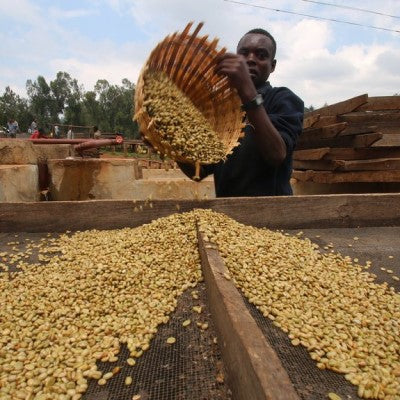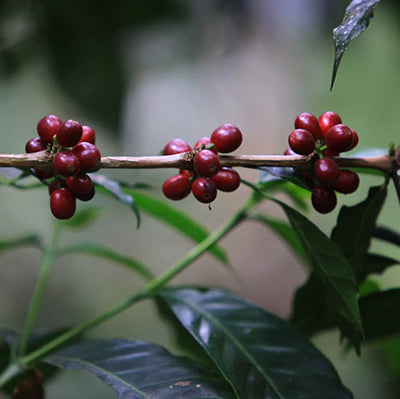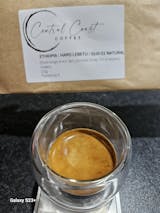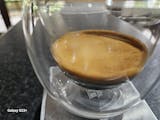

Are you looking to buy Ethiopia | Haro Lebetu | Guji Grade 1 Natural in Australia?
Tasting Notes/Sensory: Blood orange, lemon, dark chocolate, honey, hint of raspberry
SCA CUPPING SCORE: 83+
Suitable with Milk? YES
Roast Level: Medium
AGTRON: 55
Roasted Level Suits: Espresso
PROCESSING: Natural
VARIETALS: Kudhumi and local selections
Altitude: 1800-2300m
OWNER: Welichu Wachu
REGION/AREA: Yabitu Koba
Screen%: 14-17
Welichu Wachu draws on wet and natural processed coffee from a number of coffee growing zones such as Suke Kudansa, Hawata Harsu Hanku, Harsu Sala, Harsu Haro muda (Muda Tatesa), Lacho Torka, Raro Boda, Boye, Yabitu Koba (Haro Lebetu).
All the coffees from one of the 36 grower co-operatives, each farmer cultivating coffee in what’s known locally as ‘coffee gardens.’ Each farmer grows roughly 1000 to 1800 trees per hectare, the plants are mostly fertilised with organic material and intercroped with various food crops. This type of farming accounts for roughly 50% of the coffee grown in the regions.
Welichu Wachu draws on wet and natural processed coffee from a number of coffee growing zones such as Suke Kudansa, Hawata Harsu Hanku, Harsu Sala, Harsu Haro muda (Muda Tatesa), Lacho Torka, Raro Boda, Boye, Yabitu Koba (Haro Lebetu).
All the coffees from one of the 36 grower co-operatives, each farmer cultivating coffee in what’s known locally as ‘coffee gardens.’ Each farmer grows roughly 1000 to 1800 trees per hectare, the plants are mostly fertilised with organic material and intercroped with various food crops. This type of farming accounts for roughly 50% of the coffee grown in the regions.
Welichu Wachu washed coffees soak in water for 4 – 6 hours then dried on raised beds for 5 – 6 days, the drying parchments no more than 2 – 3 cm deep. The parchment is frequently raked and then covered during hot midday sun. Beans exposed to the hot noon sun especially on the 4th or 5th day can lead to the parchment cracking and the green bean inside becoming shrivelled. After drying, the parchment is packed in clean bags and then it spends a further 5 days conditioning in the warehouse.
The Natural coffees undergo laborious hand sorting to remove green or under ripe cherries before being spread on the drying tables 4-5 cm deep. The drying cherries are raked and ridged hourly and like the parchment, covered during the midday heat. After drying for 10 – 12 days, a handful of dried cherries should produce a rattling sound when shaken. The final test is that the weight of a sample of coffee is the same for two consecutive days.
Ethiopia Grade 1
Grades in Ethiopia depend on visual inspection for defects and on cup quality. Grade 1 is considered the highest quality coffee. Grade 1 and 2 are considered specialty coffee, grades 3-9 are classified as commercial coffee. Grade 1 is free of cup faults and taints and has zero quakers.
Coffee in Ethiopia
While Ethiopia is famous as coffee’s birthplace, today it remains a specialty coffee industry darling for its incredible variety of flavors. While full traceability has been difficult in recent history, new regulations have made direct purchasing possible. We’re partnering directly with farmers to help them produce top quality specialty lots that are now completely traceable, adding value for farmers and roasters, alike.
The exceptional quality of Ethiopian coffee is due to a combination of factors. The genetic diversity of coffee varieties means that we find a diversity of flavor, even between (or within) farms with similar growing conditions and processing. In addition to varieties, processing methods also contribute to end quality. The final key ingredients for excellent coffee in Ethiopia are the producing traditions that have created the genetic diversity, processing infrastructure and great coffee we enjoy today.
Most producers in Ethiopia are smallholders, and the majority continue to cultivate coffee using traditional methods. As a result, most coffee is grown with no chemical fertilizer or pesticide use. Coffee is almost entirely cultivated, harvested and dried using manual systems.
SKU: rc_ethiopia-ht-ngg1-1000g
Package Weight: 1050g




